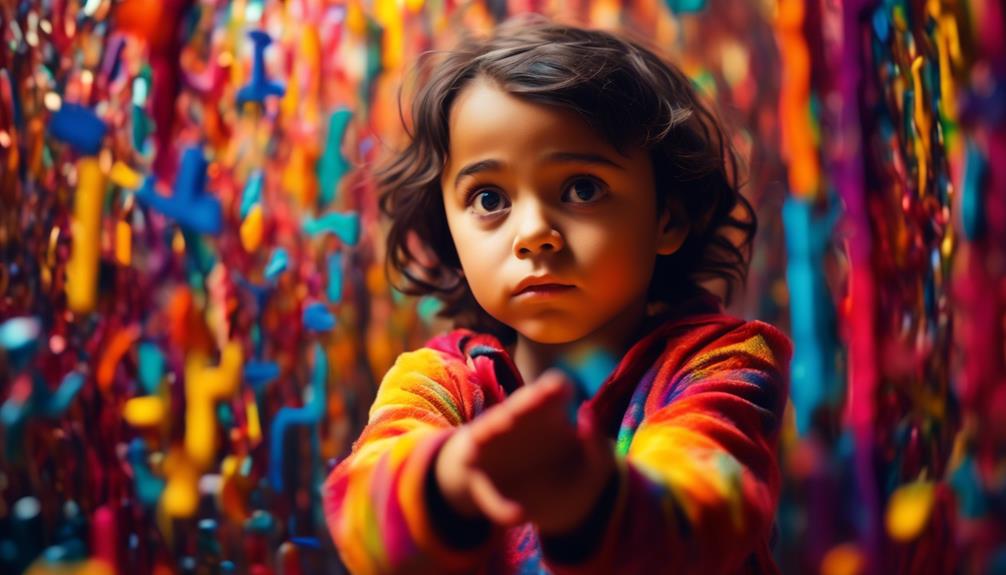The Role of Art in Enhancing Cognitive Development

Art enhances cognitive development by stimulating creativity, imagination, and critical thinking skills. These skills, in turn, improve problem-solving abilities and overall cognitive functioning.
Key Takeaways
- Art stimulates creativity, imagination, and critical thinking skills.
- Art serves as a catalyst for critical thinking and exploring new perspectives.
- Art unlocks new perspectives and approaches to problem-solving.
- Artistic expression enhances cognitive abilities and emotional intelligence.
The Cognitive Benefits of Art
Have you ever wondered how art can enhance your cognitive abilities?
The cognitive benefits of art are truly remarkable. From improving memory and concentration to enhancing problem-solving skills, art has been proven to have a positive impact on our cognitive development.
Art therapy, a form of therapy that utilizes the creative process of making art to improve a person's well-being, has been widely used to enhance cognitive functions. Through art therapy, individuals are able to express their thoughts and emotions in a non-verbal way, allowing them to gain a deeper understanding of themselves and their experiences. This process can help improve memory and concentration as it engages different areas of the brain.
Furthermore, art appreciation, the act of observing and reflecting upon art, can also have significant cognitive benefits. When we engage with art, our brains are stimulated and challenged, promoting critical thinking and problem-solving skills. By analyzing and interpreting different artworks, we develop our ability to think creatively and make connections between different concepts.
Incorporating art into our lives can have a profound effect on our cognitive abilities. Whether through art therapy or art appreciation, the power of art to enhance our cognitive development shouldn't be underestimated.
Art and Critical Thinking
Art serves as a catalyst for critical thinking, inviting you to explore new perspectives and challenge conventional ways of thinking. When engaging with art, whether it be through visual arts, music, or literature, you're encouraged to analyze, interpret, and make decisions. The process of creating and appreciating art requires analytical thinking, as you examine the elements and principles of design, the symbolism and meaning behind the artwork, and the techniques used by the artist. This analytical approach extends to decision making, as you evaluate different artistic choices and determine the impact they've on the overall composition.
Art challenges you to think critically by presenting complex ideas, emotions, and concepts in a way that may not be immediately apparent. It encourages you to delve deeper, question assumptions, and consider alternative perspectives. By engaging with art, you develop the ability to analyze information, draw connections, and think critically about the world around you.
Moreover, art provides a safe space for experimentation and risk-taking, fostering a mindset of open-mindedness and curiosity. Through art, you're encouraged to explore different possibilities, challenge existing norms, and think outside the box. This creative approach to problem-solving can be applied to various aspects of your life, enabling you to find innovative solutions and make informed decisions.
Enhancing Problem-Solving Skills Through Art
When it comes to problem-solving, art can be your greatest ally.
Through creative thinking and artistic expression, you can unlock new perspectives and approaches to tackle challenges.
By engaging in visual perception and embracing innovation, art becomes a powerful tool to enhance your problem-solving skills.
Creative Thinking and Problem-Solving
Enhancing problem-solving skills through the transformative power of artistic expression unlocks a world of boundless creativity and innovative thinking. By engaging in art, you tap into your inherent ability to think outside the box, finding unique solutions to the challenges you face.
Here are five ways in which art enhances your creative thinking and problem-solving skills:
- Encourages experimentation: Art allows you to explore different techniques, materials, and perspectives, pushing you to experiment and find unconventional solutions.
- Fosters imagination: Through art, you learn to think imaginatively, envisioning new possibilities and alternative scenarios.
- Cultivates flexibility: Art teaches you to adapt and be flexible in your approach, as you navigate the various stages of creation.
- Enhances observation skills: Art trains your eye to pay attention to details, patterns, and relationships, sharpening your ability to observe and analyze situations.
- Promotes risk-taking: Art empowers you to take risks, embrace mistakes, and learn from them, fostering resilience and a growth mindset.
Through art, you not only become a better problem solver but also gain a deeper understanding of yourself and the world around you.
Artistic Expression and Cognition
As you delve into the realm of artistic expression, you open the door to a world of cognitive development that expands your problem-solving skills beyond imagination. Artistic expression, particularly through art therapy, has been proven to enhance cognitive abilities and emotional intelligence.
When you engage in artistic activities, you tap into your creative side, allowing your mind to think outside the box and approach problems from different angles. This process stimulates critical thinking, analytical skills, and cognitive flexibility. Through art, you learn to observe, analyze, and interpret visual information, honing your ability to identify patterns, make connections, and find innovative solutions.
Moreover, artistic expression nurtures emotional intelligence by allowing you to explore and express your emotions in a safe and constructive manner. By embracing art, you embark on a transformative journey that not only enhances your problem-solving skills but also nurtures your emotional well-being.
Visual Perception and Innovation
Indulging in the realm of art unlocks a world of visual perception and innovation, expanding your problem-solving skills beyond imagination. Through the act of creating or observing art, you train your mind to perceive the world in a new light, to see the hidden connections, patterns, and possibilities that others might overlook. Visual perception allows you to analyze complex information, break it down into manageable parts, and make meaningful connections.
Innovation, on the other hand, is the ability to think outside the box, to come up with novel solutions to problems. Art encourages you to embrace ambiguity, to explore different perspectives, and to push the boundaries of what's considered conventional. By engaging in art, you cultivate a mindset of innovation that can be applied to all aspects of your life.
In the realm of art, visual perception and innovation go hand in hand, leading to the development of problem-solving skills that are crucial in today's rapidly changing world. Here are five key aspects of visual perception and innovation that art can enhance:
- Increased attention to detail: Art trains you to observe and appreciate the subtle nuances, textures, and colors in the world around you. This heightened attention to detail can lead to a more thorough analysis of problems and the ability to identify creative solutions.
- Enhanced spatial reasoning: Art often involves working with shapes, forms, and perspectives, which can improve your spatial reasoning skills. This can be particularly useful in fields such as architecture, design, and engineering.
- Strengthened pattern recognition: Art trains your brain to identify patterns and relationships, which can be applied to various problem-solving scenarios. Recognizing patterns can help you make connections, identify trends, and find innovative solutions.
- Improved divergent thinking: Art encourages you to think outside the box, to explore different possibilities and perspectives. This fosters divergent thinking, allowing you to generate a wide range of creative ideas and solutions.
- Cultivated imagination: Art stimulates your imagination, allowing you to envision new possibilities and explore alternative realities. This imaginative thinking can fuel innovation and lead to groundbreaking ideas.
Art as a Tool for Spatial Reasoning
How can art engage your mind and enhance your spatial reasoning abilities? The answer lies in the intricate relationship between art, mathematical reasoning, and language development.
When you immerse yourself in the world of art, whether through painting, sculpture, or design, you're presented with unique opportunities to develop your spatial reasoning skills. Art requires you to think in three dimensions, to visualize objects from different angles, and to understand how they fit together in space. This process strengthens your ability to mentally manipulate objects, a skill that's essential for tasks such as solving puzzles or constructing complex structures. By engaging with art, you're exercising your brain's spatial reasoning capabilities, enhancing your ability to perceive and interpret the visual world around you.
Moreover, art also has a profound impact on language development. Through art, you learn to express yourself in non-verbal ways, using symbols, colors, and shapes to communicate your thoughts and emotions. This not only helps to foster creativity but also improves your ability to interpret and understand visual cues in the world. Art, therefore, serves as a bridge between the visual and linguistic domains, facilitating the development of both areas.
The Impact of Music on Cognitive Development
Are you ready to be amazed by the incredible impact of music on cognitive development?
Get ready to experience the power of melody and rhythm as we explore the fascinating connection between music and memory.
From catchy tunes that stick in your head to the ability to recall lyrics effortlessly, music has a profound effect on our ability to remember and retain information.
Music and Memory
Listening to music has the remarkable ability to enhance memory and stimulate cognitive development. It's a powerful tool that can transport you to another time and place, evoking a flood of emotions and memories. When it comes to the impact of music on memory, the benefits are undeniable.
Here are five ways music can enhance your memory and cognitive abilities:
- Music activates multiple areas of the brain, promoting better memory retention.
- Certain melodies and rhythms can trigger emotional responses, helping you remember events and experiences more vividly.
- Music therapy has been shown to improve memory and cognitive function in individuals with Alzheimer's disease and other forms of dementia.
- Learning and memorizing lyrics to songs can improve verbal memory and language skills.
- Playing a musical instrument can enhance cognitive skills such as problem-solving and multitasking.
Musical Intelligence
Immerse yourself in the captivating world of musical intelligence and discover the profound impact it has on cognitive development.
Musical creativity isn't just about playing an instrument or singing; it goes beyond that. It involves the ability to express emotions, communicate ideas, and think abstractly through music.
When you engage in musical activities, your brain is stimulated in unique ways, enhancing your cognitive abilities. Studies have shown that musical training improves auditory perception, allowing you to better process and interpret sounds.
This heightened auditory perception extends to speech and language skills, helping you to become a better listener and communicator.
Dance and Cognitive Growth
Dance, with its rhythmic movements and expressive gestures, plays a vital role in fostering cognitive growth and development. It goes beyond the mere act of physical movement, engaging both the body and the mind. Through dance, individuals can experience a unique form of expression and connect with their emotions in a profound way.
Here are five ways in which dance enhances cognitive growth:
- Improved memory: Dance requires individuals to remember choreography and sequences of movements, which exercises their memory and enhances cognitive function.
- Enhanced focus and attention: The discipline required in dance cultivates focus and concentration, improving attention span and the ability to stay present in the moment.
- Increased creativity: Dance encourages individuals to explore new movements and express themselves creatively, stimulating the brain's creativity centers.
- Boosted problem-solving skills: Dance challenges individuals to find solutions to physical and spatial problems, fostering critical thinking and problem-solving abilities.
- Heightened body awareness: Through dance, individuals develop a greater sense of body awareness, understanding how their bodies move and interact with space, leading to improved coordination and proprioception.
Integrating Art Into Educational Programs
As we explore the role of art in cognitive development, it becomes evident that integrating art into educational programs is essential for fostering holistic growth and enhancing cognitive abilities.
Artistic creativity is a powerful tool that can stimulate the imagination, promote critical thinking, and encourage self-expression. By incorporating art into the educational curriculum, we provide students with an opportunity to engage in a multidimensional learning experience that goes beyond traditional academic subjects.
Integrating art into educational programs not only allows students to explore their creative potential but also helps them develop important cognitive skills. Through artistic activities such as painting, drawing, and sculpture, students learn to observe, analyze, and interpret the world around them. They learn to think outside the box, experiment with different ideas, and find innovative solutions to problems. Art also fosters emotional intelligence, empathy, and self-awareness, as students express their thoughts and feelings through various art forms.
Furthermore, integrating art into the educational curriculum can enhance students' overall learning experience. It provides a balance between analytical thinking and creative expression, allowing students to develop both sides of their brain. Art promotes interdisciplinary learning, connecting different subjects and encouraging students to make connections and think critically. It also helps students develop important life skills such as communication, collaboration, and adaptability.
Frequently Asked Questions
How Does Art Contribute to Emotional Intelligence and Social Development?
Artistic expression and empathy are key components of emotional intelligence and social development. The therapeutic benefits of art allow you to tap into your emotions, understand others better, and foster meaningful connections.
Can Art Improve Memory Retention and Recall Abilities?
You'll be amazed at how art therapy can enhance your memory retention and recall abilities. The effects it has on brain function are truly remarkable, making it a powerful tool for cognitive development.
What Are the Long-Term Effects of Art on Cognitive Development?
Boost your brain power with the beauty of art. Discover the lasting benefits of art therapy for cognitive development and the profound impact of art education on brain development. Unleash your potential through creativity.
Is There a Correlation Between Artistic Creativity and Higher Academic Achievement?
Artistic creativity has been found to have a positive correlation with higher academic achievement. Not only does it enhance problem-solving skills, but it also opens up career prospects in various fields, showcasing the impact of art on cognitive development.
Are There Specific Art Forms or Mediums That Are More Beneficial for Cognitive Development Than Others?
You'll be amazed at how different art forms can shape your mind! Some art forms have a way of boosting your cognitive abilities like never before. Get ready to explore the captivating world of art and its incredible cognitive benefits.









